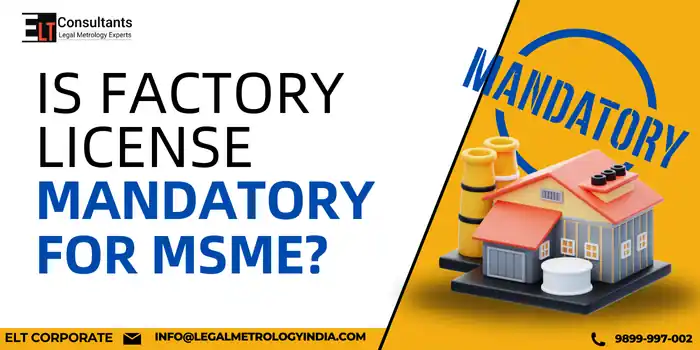Micro, Small, and Medium Enterprises (MSMEs) have been the backbone of the Indian economy for decades, contributing significantly to GDP, employment, and exports. With the government’s push towards promoting MSMEs, many entrepreneurs are stepping into this space. However, one of the most frequently asked questions is whether a Factory License mandatory for MSMEs.
This guide will explore everything you need to know about factory licenses and their necessity for MSMEs. We will cover various aspects, including the legal requirements, the applicability of factory licenses to MSMEs, and the step-by-step process to obtain such licenses.
What is a Factory License?
A Factory License is a legal permit that allows the establishment and operation of a factory under the regulations of the Factories Act 1948. This law governs the working conditions of workers and outlines safety, health, and welfare measures in factories. It is mandatory for businesses that meet specific criteria outlined in the Act.
Applicability of Factory License Mandatory for MSME
The need for a factory license depends on the type of business and the nature of its operations. Not every MSME requires a factory license. The Factories Act of 1948 primarily applies to companies involved in uring and a certain number of workers.
Critical Points for Applicability:
- Manufacturing Units: If an MSME is involved in manufacturing processes and employs more than ten workers with power or more than 20 workers without power, it falls under the ambit of the Factories Act, and obtaining a factory license becomes mandatory.
- Service Sector MSMEs: MSMEs in the service sector are usually optional to obtain a factory license, as the Factories Act is more relevant to manufacturing units.
- Exemptions: There are some exemptions for smaller units, depending on state-specific rules, the scale of operations, and the number of employees. However, even if an MSME falls under an exempt category, it may still need to comply with local regulations, such as municipal licenses or pollution control board clearances.
Why is a Factory License Mandatory for MSME?
It is not just a legal formality; Factory License Mandatory for MSME for several reasons:
- Compliance with Laws: The factory license ensures that the MSME complies with the provisions of the Factories Act, primarily related to the safety, health, and welfare of workers. Non-compliance can result in hefty fines, closure of the business, or legal action.
- Credibility: Having the necessary licenses adds credibility to the MSME. It reassures stakeholders—clients, employees, or investors—that the business adheres to the required legal and operational standards.
- Access to Government Benefits: Many government schemes and benefits for MSMEs are contingent upon the business fully complying with all regulations, including possessing a factory license.
- Avoidance of Legal Issues: Operating without a required factory license can lead to operational disruptions, penalties, and even the shutdown of the business. It’s vital to have all legalities in place to avoid these risks.
When is a Factory License Mandatory For MSME?
The Factories Act 1948 sets forth specific criteria that determine whether a factory license is mandatory for a business:
- Worker Count: A factory license is mandatory if the MSME employs more than ten workers and uses power or more than 20 workers without the use of power.
- Type of Industry: The need for a factory license is more common in industries such as manufacturing, processing, assembling, and related activities.
Types of Licenses Required for MSMEs Apart from Factory License
While the factory license may be essential for some MSMEs, there are other licenses and registrations that MSMEs may need to comply with, depending on their operations.
- Udyam Registration (formerly Udyog Aadhaar)
Every MSME must register itself under the Udyam Registration portal. The government needs to recognize an MSME and help the business avail of various benefits such as subsidies, tax rebates, and access to credit.
- Pollution Control Board Certificate
If an MSME involves manufacturing processes that may lead to pollution, it must obtain a Pollution Control Board Certificate. This certificate ensures the business complies with environmental standards and avoids harming the ecosystem.
- Shops and Establishments Act License
If the MSME operates a shop, commercial establishment, or office, it must comply with the Shops and Establishments Act in the respective state. This law governs the working hours, employment conditions, wages, and other aspects of business operations.
- Goods and Services Tax (GST) Registration
If the turnover of the MSME exceeds the threshold limit specified under the GST law, registration for GST becomes mandatory. GST registration enables the business to collect and remit taxes to the government and avail of input tax credits.
- Other Local Licenses
Depending on the location and nature of business, the MSME may also require local licenses such as trade licenses, fire safety certificates, or zoning permissions from municipal authorities.
Steps to Obtain a Factory License for MSMEs
If your MSME requires a factory license, the following are the general steps to obtain factory license:
- Prepare Documentation
You will need to prepare various documents required for Factory License, including:
- Proof of ownership or lease agreement of the factory premises
- Factory layout plan
- Details of workers employed
- Description of the manufacturing process
- NOC from the local authority or pollution control board (if applicable)
- Submit the Application
Submit the factory license application to your state’s Chief Inspector of Factories. The application can be submitted online through the relevant state department’s portal. Ensure that all necessary documents are attached.
- Inspection by Authorities
Once the application is submitted, authorities from the Factories Department may inspect the premises to verify compliance with the provisions of the Factories Act. During this inspection, they will evaluate safety measures, working conditions, and other aspects of the business.
- Issuance of License
If the inspection is successful and the application is complete, the respective state authority will issue the factory license. It is generally issued for a specific period, after which it must be renewed.
Penalties for Non-Compliance With Factories Act
Operating without a mandatory factory license can lead to several penalties, including:
- Fines: Non-compliance with the Factories Act can lead to substantial penalties, which can vary based on the gravity of the violation.
- Closure of Business: In some cases, the authorities may order the factory’s closure if it operates without the necessary licenses.
- Legal Proceedings: Persistent violations can lead to legal actions, and the business owner may face imprisonment in extreme cases of non-compliance.
Conclusion – Factory License Mandatory For MSME
While only some MSMEs are required to obtain a factory license, it is mandatory for businesses that meet the criteria outlined in the Factories Act 1948. Ensuring that a factory license is in place for manufacturing MSMEs is crucial for compliance, credibility, and long-term sustainability.
Apart from the factory license, MSMEs must comply with other licenses and regulations applicable to their business operations. These could include GST registration, pollution control certificates, and local municipal permits.
Staying informed about the legal requirements and ensuring timely compliance will help avoid penalties and pave the way for business growth and access to government incentives for MSMEs.
Is Factory License Mandatory for All MSMEs?
No, only MSMEs involved in manufacturing with more than ten workers (with power) or 20 workers (without power) need a factory license.
What are the Benefits of Having a Factory License for an MSME?
It ensures legal compliance, enhances credibility, and provides access to government schemes and benefits.
How Do I Know If My MSME Needs a Factory License?
You need a factory license if you’re engaged in manufacturing with more than ten workers (with power) or 20 workers (without power).




